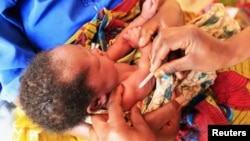KAMPALA, Uganda — Members of parliament say they will block the passage of Uganda’s budget unless there is a substantial increase in funding for health care. With the budget debate scheduled to open this week, parliamentarians called on the government to do more to address what they say is a health emergency.
In Uganda, there are fewer than two health workers for every 1,000 people - a level the World Health Organization defines as a severe shortage.
Uganda’s social services committee, which has initial oversight of the country’s health budget, pushed a resolution through parliament last week threatening to hold up approval of the entire budget unless funding to recruit and retain new health workers is increased.
Committee members, with support from the Women's Parliamentary Association, called for a specific increase of at least $103 million to the sector.
Rosemary Nyakikongoro, a parliamentarian and vice chairperson of the association, said that would be enough money to fill more than half of the positions for doctors, nurses and midwives at government health centers.
Until the money is forthcoming, she said, parliamentarians are prepared to hold up voting on the budget.
“Our health sector is lagging behind, especially in terms of health personnel. We have limited human resources," said Nyakikongoro. "For that matter, as parliament, we are not going to pass this budget - not the health sector budget, but the entire budget - until government recommits itself to increasing the health sector budget by 260 billion shillings [$103 million].”
In addition to the funding increase, the parliamentarians are calling for an end to a wage freeze for current employees and a ban on recruiting new health workers. They also are demanding a supplementary pool of money to improve health care in communities that are particularly short staffed.
“All members of parliament are concerned, even in their districts where they come from, all health centers have less than 50 percent staffing," said Nyakikongoro. "We all want to see all our health facilities well facilitated in terms of personnel.”
Nyakikongoro said government officials from the Ministry of Finance have not responded to the parliamentarians’ resolution.
The current draft budget allocates $307.5 million to the health sector - around 7 percent of the total budget. Even before the budget was officially introduced, Ministry of Health officials had acknowledged there would not be enough money to fill health worker gaps.
Without more doctors, nurses and midwives, though, activists say the country’s health indicators will continue to deteriorate. They pointed specifically to an increase in Uganda’s HIV prevalence rate from 6.4 percent in 2005 to 7.3 percent last year.
Mable Kukunda, a program officer with Uganda National Health Consumers’ Organization, applauded the parliamentarians’ move.
“We think that with the current crisis of health workers that is in the country, we think that is the right move that parliament has done,” said Kukunda.
Following all of the committee reports, the budget is scheduled to move to the entire parliament for debate this week. It is traditionally passed by the middle of September.
In Uganda, there are fewer than two health workers for every 1,000 people - a level the World Health Organization defines as a severe shortage.
Uganda’s social services committee, which has initial oversight of the country’s health budget, pushed a resolution through parliament last week threatening to hold up approval of the entire budget unless funding to recruit and retain new health workers is increased.
Committee members, with support from the Women's Parliamentary Association, called for a specific increase of at least $103 million to the sector.
Rosemary Nyakikongoro, a parliamentarian and vice chairperson of the association, said that would be enough money to fill more than half of the positions for doctors, nurses and midwives at government health centers.
Until the money is forthcoming, she said, parliamentarians are prepared to hold up voting on the budget.
“Our health sector is lagging behind, especially in terms of health personnel. We have limited human resources," said Nyakikongoro. "For that matter, as parliament, we are not going to pass this budget - not the health sector budget, but the entire budget - until government recommits itself to increasing the health sector budget by 260 billion shillings [$103 million].”
In addition to the funding increase, the parliamentarians are calling for an end to a wage freeze for current employees and a ban on recruiting new health workers. They also are demanding a supplementary pool of money to improve health care in communities that are particularly short staffed.
“All members of parliament are concerned, even in their districts where they come from, all health centers have less than 50 percent staffing," said Nyakikongoro. "We all want to see all our health facilities well facilitated in terms of personnel.”
Nyakikongoro said government officials from the Ministry of Finance have not responded to the parliamentarians’ resolution.
The current draft budget allocates $307.5 million to the health sector - around 7 percent of the total budget. Even before the budget was officially introduced, Ministry of Health officials had acknowledged there would not be enough money to fill health worker gaps.
Without more doctors, nurses and midwives, though, activists say the country’s health indicators will continue to deteriorate. They pointed specifically to an increase in Uganda’s HIV prevalence rate from 6.4 percent in 2005 to 7.3 percent last year.
Mable Kukunda, a program officer with Uganda National Health Consumers’ Organization, applauded the parliamentarians’ move.
“We think that with the current crisis of health workers that is in the country, we think that is the right move that parliament has done,” said Kukunda.
Following all of the committee reports, the budget is scheduled to move to the entire parliament for debate this week. It is traditionally passed by the middle of September.










